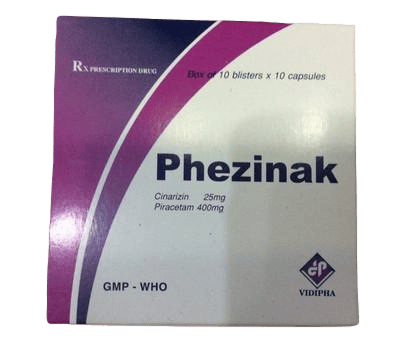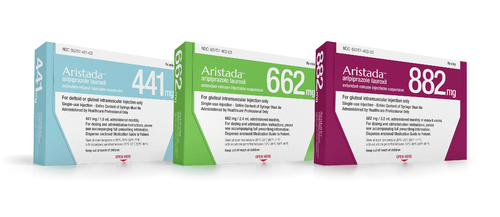This is an automatically translated article.
Citopam is manufactured and registered by Sun Pharmaceutical Industries Ltd., which belongs to the group of psychotropic drugs. So what is Citopam drug used for and in what cases is it used?
1. What is Citopam?
Citopam medicine has the main ingredient containing the active ingredient Citalopram (in the form of Citalopram hydrobromide) with a concentration of 10 mg or 20 mg (Citopam 10 and Citopam 20), which is made in the form of tablets, presented in a box of 3 blisters, in which 1 blister contains 10 tablets.
2. Effects of Citopam
The active ingredient Citalopram hydrobromide in Citopam belongs to a group of selective serotimin reuptake inhibitors (also known as SSRIs), which are a substance that works to block nerve cells from absorbing serotonin.Citopam 10 or Citopam 20 is indicated for use in the following cases:
Indicated in cases of patients with depression in the early stages and maintenance therapy to prevent relapse. Treatment of phobias , anxiety disorders , panic disorders with or without agoraphobia .
3. Usage and dosage of Citopam
3.1. How to use Citopam drug Citopam drug is prepared in the form of tablets, used orally, taken a single dose with filtered water, do not chew, bite or crush the tablet, the duration of use of the drug does not depend on the time. meal.
In the first 2 weeks after starting treatment for the patient will not see any antidepressant effect. Treatment must continue until the patient is symptom-free for 4 to 6 months. Citopam should not be stopped abruptly, but should be stopped gradually with a reduction in dose over 1 to 2 weeks.
3.2. Dosage of the drug Citopam Do not use Citopam for children and adolescents under 18 years of age.
Adults: The recommended dose for monotherapy is 20 mg/day (equivalent to 1 Citopam 20 tablet). Depending on individual patient response, the dose may be increased to a maximum of 40 mg/day (equivalent to 2 Citopam 20 tablets). In the elderly (over 65 years of age): The dose for the elderly should be half of the recommended dose of 10 - 20 mg/day. In patients with renal impairment: In patients with mild or moderate renal impairment, no dose adjustment is necessary, with patients with severe renal impairment contraindicated to use Citopam. In patients with hepatic impairment: In patients with mild or moderate hepatic impairment, an initial dose of 10 mg/day (1 Citopam 10 tablet) is recommended during the first 2 weeks of treatment. Based on the patient's response, the dose may be increased to a maximum of 20 mg/day (1 Citopam 20 tablet). Caution should be exercised in patients with severe hepatic impairment. In patients with poor metabolism via CYP2C19: The starting dose should be 10 mg/day (1 Citopam 10 tablet) for the first 2 weeks. Depending on the patient's response, the dose may be increased to 20 mg/day (1 Citopam 20 tablet). 3.3. Overdose and Citopam Overdose Treatment Symptoms may be encountered when using Citopam overdose such as: drowsiness, convulsions, prolongation of the QT interval, fast or slow heart rate, coma, tremor, vomiting, cardiac arrest , increased or decreased blood pressure, Serotonin syndrome, dizziness, agitation, torsades de pointes, mydriasis, cyanosis, sweating, hyperoxygenation, hypoventilation, atrial arrhythmias, ventricular arrhythmias.
Treatment: Currently, there is no specific antidote for Citopam overdose. Patients should be taken immediately to medical facilities for supportive treatment, symptoms, monitoring until the patient stabilizes or emergency treatment if the patient has more severe symptoms.
4. Undesirable effects of Citopam
During the use of Citopam, patients may experience the following undesirable effects:
Common side effects: weight loss, decreased appetite, agitation, sleep disturbance, anxiety , decreased libido, nervousness, insomnia, drowsiness, paresthesia, tremor, dizziness, amnesia, migraine, tinnitus, palpitations, rhinitis, yawning, nausea, dry mouth, increased salivation, flatulence, constipation, diarrhea, itching, increased sweating, joint pain, muscle pain, ejaculation disorder. Less common side effects include: weight gain, increased appetite, hallucinations, depersonalization, increased libido, mania, syncope, dilated pupils, fast or slow heart rate, rash, eyebrows urticaria, photosensitivity, alopecia, edema. Rare side effects such as: hyponatremia, taste disturbances, movement disorders, hepatitis, cough. Adverse events of unspecified frequency such as: thrombocytopenia, anaphylaxis, hypersensitivity, inappropriate ADH secretion, suicidal behavior or suicidal ideation, hypokalemia, visual disturbances, confusion extrapyramidal, convulsions, Serotonin syndrome, Akathisia syndrome, gastrointestinal bleeding. It is recommended that patients during treatment with Citopam, if experiencing any abnormal symptoms, should stop using the drug and notify the treating doctor for timely and effective treatment.
5. Citopam drug interactions
When co-administered with the following drugs with Citopam may occur interactions:
Citopam plasma concentrations are increased when co-administered with inhibitors of CYP2C19 or Cimetidine. Serotonin syndrome can occur when Citopam is co-administered with Monoamine oxidase inhibitors, so concomitant use of these drugs is not recommended. When Citopam is used together with drugs that stimulate the release of Serotonin, it causes hyperserotonin syndrome. Increased risk of malignant arrhythmias when used concomitantly with magnesium-lowering drugs, hypokalemia. Tryptophan or Lithium when used concurrently with Citopam increases the concentration of the drug in the blood. All SSRIs, including Citopam, should not be used with MAO inhibitors such as tranylcypromine, isocarboxazid, phenelzin and procarbazine. This combination can cause high blood pressure, confusion, hyperactivity, and tremors. This form of drug interaction can also occur with fenfluramine, selegiline, dexfenfluramine, tryptophan causing headache, sweating, nausea, dizziness.
6. Note when using Citopam
6.1. Citopam's contraindications are not contraindicated to use Citopam in the following subjects:
Not contraindicated in patients with a history of hypersensitivity to Citalopram, Escitalopram or any of the excipients contained in Citopam. Do not use in patients with severe renal impairment. Do not use for pregnant and lactating women, children under 15 years old. 6.2. Caution when using Citopam drugs Caution when prescribing Citopam in elderly subjects, people with a history of severe renal or hepatic impairment. Caution should be exercised in patients with glaucoma, history of hypomania, acute myocardial infarction, bradycardia, decompensated heart failure. Patients should be closely monitored during early initiation and subsequent dose modification, considering the treatment of patients with major depressive disorder with other psychiatric disorders. May cause hyponatremia due to inappropriate secretion of antidiuretic hormone (SIADH), which is usually reversible upon discontinuation of the drug, a risk seen in elderly female patients. Citopam treatment may alter glycemic control in patients with diabetes. Consideration should be given to adjusting the dose of insulin and hypoglycemic agents. Citopam use can affect the size of the pupil, causing pupil dilation, caution should be used when using the drug in patients with a history of glaucoma or angle-closure glaucoma.
7. Preservation of Citopam
Store Citopam medicine in a cool, dry place, avoid mold, avoid direct exposure to sunlight, high temperature, because it can change some or all of the ingredients in Citopam, the appropriate temperature is below 30 degrees Celsius. Keep the medicine in a high place, out of the reach of small children.
Citopam medicine has the main ingredient containing the active ingredient Citalopram, which is indicated for the treatment of a number of neurological diseases. To ensure the effectiveness of treatment and avoid unwanted side effects, patients need to take the drug exactly as directed by a doctor or pharmacist.
Follow Vinmec International General Hospital website to get more health, nutrition and beauty information to protect the health of yourself and your loved ones in your family.













